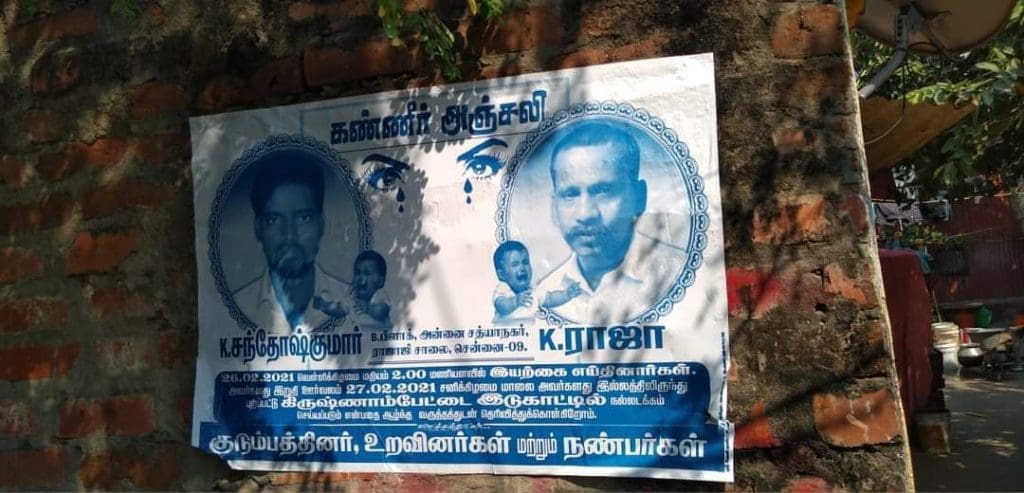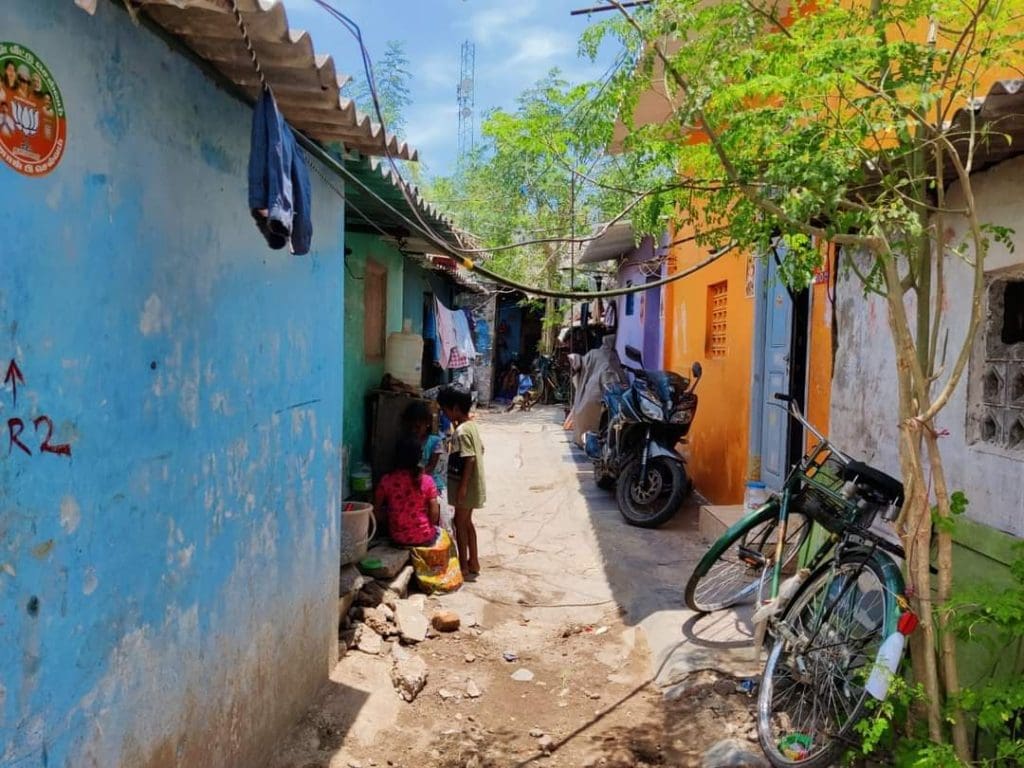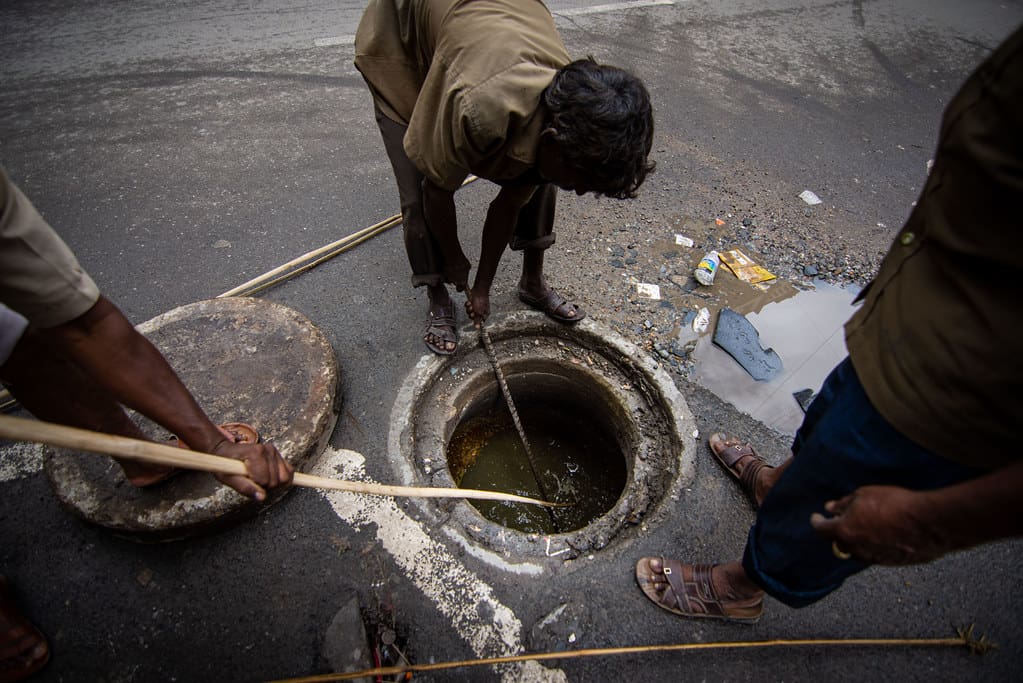
On a wall in a thickly populated Dalit colony near Fort St. George in Chennai is an elegy to two people who died last month while cleaning a 15-feet-deep septic tank. In countless Dalit colonies in the country live families of victims of a banned practice that continue to kill today, right under the radar of governments.
The recent deaths of Raja and Santhosh while cleaning the septic tank in the military campus at Fort St. George reveals how the state is the principal employer facilitating the practice and evading responsibility and at times failing to provide compensation.
“My father used to slither down into manholes like those,” said Ranjitha, the 14-year-old daughter of Raja, pointing at a manhole in front of the colony where she lives.
The girl’s statement contradicted the Chennai Metropolitan Water Supply and Sewerage Board engineers’ repetitive claims about mechanisation and how people were not employed to go down the sewers.
“For more than six years, we have used machines for cleaning sewers like jet rodding devices and super suckers,” said R. Pukalenthi, Area Engineer of Adyar zone. “All the houses have sewer connection to the main sewage system. So, there is no need for employing people to go down septic tanks or sewers,” he added.
“There are 14 jet rodding machines, three sewer lorries and six super suckers which suck 6000 litres of waste. The jet rodding machines remove sewer blocks so, nowadays we don’t encourage manual scavenging,” he said. “It mostly happens in the villages,” he vehemently said.
However, according to reports by Union Ministry of Housing and Urban affairs, Tamil Nadu accounted for 45 percent of manual scavenging deaths in India, with Chennai topping the table for its dubious record of deaths.


“Government hires contractors and they employ people. As the machines are costly, the contractor pays these labourers much lesser as a means of retrenchment and makes profits,” said Subagunam, a reporter at Vikatan magazine.
The intense privatisation of the banned activity has helped the government evade responsibility, especially the Indian Railways.
Government inviting tenders to private contractors for hiring manual scavengers for cleaning sewers and septic tanks still exist. The most recent being in the military campus in Tamil Nadu secretariat compound, where two people met their ends in a 15-feet-deep septic tank. The Military campus hired Sristal Systems Pvt Ltd., to clean the tank, which hired five people from Sathya Nagar colony.
Even though every manual scavenging death is a direct violation of Article 21 of the Indian Constitution, these deaths are directly connected to the government. Article 300 (1) provides the right to the citizens to sue the state.
Apart from this, by vicarious liability, the state has to bear the responsibility of the crime if it is the principal employer and the agent commits a crime. Adding to this is the ban enforced on this casteist practice. Thus, the government and its institutions are equally responsible for the deaths from manual scavenging.
Ranjeeth (19), son of Raja, who died last month, said how he has also worked as a manual scavenger by getting into drainages and sewers.
“I failed 10th standard and had to start working with my father at 17. It is difficult to find other jobs once you have worked in the drainages,” he said. The abject poverty is pushing several children to work in such hazardous environments.
“The workers were ready for the job,” said another officer at the military control room. Many officers in the military offices and the Public Relations Unit said they were unaware of the incident. The officers did not comment on how a banned profession came to be practised on premises owned by the government.


The widely acknowledged notion of manual scavenging being practiced out of one’s own volition is debunked by Kala, mother of the deceased Santhosh.
“We know the risks involved but we need to do it or die starving. We don’t have government jobs or a steady income,” Kala said.
The occupation has always been followed in their family. “My father was a manual scavenger, then my son had to bear this and now he is gone,” she said. The inability to find other jobs and the caste system forces them to adhere to the occupation, she added.
Although the Act clearly defines the need to provide protective gear to the labourers, neither the contractors nor the government are aware of the hazardous repercussions that come from not wearing them.
Manivannan, a survivor said to the police that they asked for protective suits and safety equipment, which the Project Manager and the Supervisor of Sristal Systems Pvt Ltd., denied.
Company officials were arrested on the charges under Section 9 of Prohibition of employment as manual scavengers and their rehabilitation 2013 Act, The Schedule caste and the Schedule Tribe Prevention of Atrocities Act 2015 and Culpable homicide not amounting to murder, the First Information Report said. No action or investigation against the military office has been made, which is a violation of doctrine of vicarious liability.
Though the sections in the Indian Penal Code and Manual Scavenging Acts are punitive, most of the times the contractors are easily let off against the payment of a stipulated fine.
In 2016, four manual scavengers died while cleaning a septic tank at Dindigul Thalappakatti restaurant at Thoraipakkam and three people including the manager were arrested under sections like Manual Scavenging Act 2013 and Scheduled Castes Scheduled Tribes Prevention of Atrocities Act. However, on inquiring of the FIR of the case, Kannagi Nagar Police station, who were in charge of the case were hesitant in divulging details. Moreover, they were reluctant at giving the addresses of the deceased. “The case is still going on, we can’t disclose details,” said the constable at Kannagi Nagar police station.
Satheesh Kumar, son of K. Kumar, who died due to asphyxiation inside the septic tank of the restaurant, said how a second FIR was created but without the knowledge of the family.
“The manager, Naveen after being arrested based on the initial FIR was later released. I saw him in person when we were given the compensation,” he said. The restaurant chain, despite having this tainted incident, still runs successfully. Naveen was the manager till two years ago, said the staff at the restaurant. “I filed an RTI for access to the FIR, but to no avail. The government is trying hard to cover up the issue,” he said. The compensation of ten lakhs was paid by the restaurant, but the government has not paid anything though the Act clearly mentions the government’s responsibility.
The response Kumar, a student with a Masters degree in Social Work, received after his father’s death was abysmal, he said.
“As I sought rehabilitation for my family, the Councillor of Greater Chennai Corporation said that I could have my father’s job. We are denied choices, my father resorted to this work due to lack of any jobs,” he said.
“My family was threatened by the police after I approached them for accessing the FIR with the help of Safai Karamchari Andolan,” said Satheesh Kumar. There were episodes when the corporation officials yelled at him as he questioned them. “They asked me to be complicit with the compensation.” It did not end there.
A year after the incident, Kumar sent 50 sanitation workers in Kannagi Nagar for getting them registered under Manual Scavengers Act for rehabilitation. However, they were mistreated and sent away after being intimidated by threats of grave consequences, he added.
The state’s incompetence at enforcing the ban on manual scavenging through bureaucracy is evident with the Chennai Corporation’s disavowal of the practice.
This case was covered up by the institutions of the government like the Police and Chennai Corporation, which is supposed to provide rehabilitation to manual scavengers and their families after a survey every year. The Chennai Corporation Solid Waste Management does not conduct any survey and claims that manual scavenging is non-existent.
“Manual Scavenging does not exist in Chennai and we have no one registered as manual scavengers,” G. Veerappan, the superintendent of Solid Waste Management at Greater Chennai Corporation, said in a rancorous argument.
Indian Railways, the biggest offender of the Act, employs manual scavengers on a massive scale. K. Kanimozhi, DMK MP in Lok Sabha said how 95000 people were working as contractual labourers without any safety equipment. The indirect employment has always helped Railways to hide behind the smokescreen with their caste oppression hidden. Railway officials refused to comment on the issue.
Calling it a form of slavery, Krishna Veni, a member of Tamil Nadu Untouchability Eradication Front said how apathetic the system was towards manual scavengers and sanitation workers.
“You cannot call this a profession. It is a casteist and inhuman practice. Even the Southern Railways engages Dalit women in this,” she said about the direct involvement of the apparatus of the state. Veni was sceptical of the way the media reported the incident.
“The media report deaths happen due to asphyxiation and consumption of toxic fumes. Why do they not talk about the physical and mental conditions of people entering a septic tank?” she said. “In urban areas, people entering sewage and septic tanks are not considered as manual scavengers. These practices are as heinous as any,” Veni added.
Satyendra Kumar, a Dalit activist based in Delhi said how the practice of manual scavenging exists primarily because the society is based on caste. Kumar said that the system forced Dalits into the profession, irrespective of their level of education. “It is nonsensical to claim that people do it on their own volition,” he said.
The International Dalit Solidarity Network’s reports posits women being mostly employed in the practice and around 1.3 million people are involved. Reports claim 99% of manual scavengers are Dalits and among them, 95% are women.
Nevertheless, the government has washed their hands off from accountability. “In some cases, people are employed for cleaning sewers, but caste angle cannot be brought to this. It is not just about people from lower castes,” said an official at Head office, Chennai metropolitan water supply and sewerage board.
The Manual Scavenging Act 2013 prohibits the practice and the employment of such workers in all the States and Union Territories and if found to be done by any person/agency who is involved in it, they will face an imprisonment of 2 years or fine up to Rs. 1 lakh, sometimes both.
The Act is not without loopholes, the corporation workers like sweepers and cleaners also deal with the same plight, yet they are never deemed as manual scavengers.
The flawed definition of the Act, indifference by government, lukewarm enforcement of the ban, the power held by giant corporations and firms have made it impossible for the annihilation of the scourge of manual scavenging even today.
Aiswarya is a student journalist at Asian College of Journalism with a penchant for politics.



